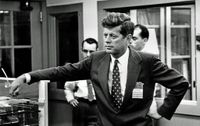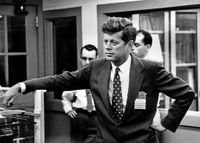The U.S. National Archives made headlines on March 18, 2025, as it released previously classified materials related to the assassination of the 35th president of the United States, John F. Kennedy. This release follows a significant decree signed by former President Donald Trump, who announced that approximately 80,000 pages of documents would be published, shedding new light on events that have haunted the nation for decades.
Included in the release were 1,123 documents showcasing various pieces of information that until now remained shrouded in secrecy. Trump remarked that withholding this information "does not outweigh overriding public interests, and the publication of these records is long overdue." His viewpoint reflects a growing demand for transparency regarding historical events that profoundly shaped American history.
The National Archives has committed to making these records available both online and in person, allowing the public to access them in a variety of formats, whether digitally, in printed form, or on analog media at their Maryland facility. As documents become digitized, they will be published, offering a gradual unveiling of the findings.
However, not all the declassified materials are free of restrictions. Some documents contain information protected by a court-ordered secrecy or are shielded to uphold the confidentiality of high-profile figures. Additionally, various records include sensitive information about tax declarations that fall under the IRS confidentiality provisions, as well as documents received from private individuals.
In a significant historical context, the Archives revealed that some documents also pertained to the assassinations of Robert Kennedy and civil rights leader Martin Luther King Jr., further expanding the narrative surrounding prominent 20th-century violence. Just months prior to this release, in January 2025, Trump had already issued a decree for the declassification of documents concerning the murders of John and Robert Kennedy in 1963 and 1968, alongside the assassination of King in 1968.
John F. Kennedy was assassinated on November 22, 1963, in Dallas, Texas, while his younger brother, Robert, was killed during his campaign for the presidency on June 5, 1968. Historian have noted that under U.S. law, the details surrounding Kennedy's assassination were supposed to be fully declassified by 2017, yet significant portions were still held back due to national security considerations.
Furthermore, some documents regarding the Kennedy assassination were made available to the public as recently as 2021, as U.S. intelligence agencies were granted further time to evaluate whether the remaining data could harm national interests or international relations. The upcoming release may bring forth new insights into the complexities surrounding these historical tragedies.
For many, the question remains whether this newfound information will reshape the public's understanding of historical events or provide closure to generations of speculation and conspiracy theories surrounding the assassinations. As citizens dive into these documents, there is hope that transparency will lead to a clearer historical narrative.
Moreover, the timing of this disclosure is poignant. Just as Americans reflect on their past and engage with ongoing conversations about governance, accountability, and the fight for civil rights, these records may serve as vital resources for educators, researchers, and the public alike.
As the nation moves forward, the release of these documents may become a crucial reference point in discussions about truth, justice, and reconciliation with America’s complicated and often painful history. Public interest will undoubtedly remain high as more records are digitized and shared, enabling a more comprehensive understanding of pivotal moments in history.
Overall, while Trump’s decree facilitates a significant release of documents, it also raises further questions about what remains classified and the broader implications of the information revealed. As more pages are scrutinized, the pursuit of knowledge continues, symbolizing a collective demand for clarity and truth.
Thus, the nation stands at a crossroads of historical reflection and potential enlightenment as these critical documents resurface, echoing through time from the troubled decades of the 1960s into the present day.





